George Armstrong Custer
The story of George Armstrong Custer (right) is a very interesting one. He came from humble beginnings, and rose to prominence as a national hero. He was disgraced, but rose to prominence again, before ultimately being remembered for the way he died.
While Custer is largely remembered for his failure at the Little Bighorn, what is often forgotten is the fact that he was a hero of the Civil War.
Let's go beyond "Custer's Last Stand," and take a look at George Armstrong Custer the hero, shall we?
Custer was born in New Rumley, Ohio, in 1839, where he became known as "Autie" (due to the way he pronounced his middle name as a toddler). He spent much of his childhood living with his half-sister and her family in Monroe, Michigan. After completing his schooling, he spent some time as a teacher himself, before being admitted to West Point in 1858.
Supposedly, Custer's West Point candidacy was supported by his congressman as a favor to a friend who wanted to keep the young Custer away from his daughter. Whatever the case, George Armstrong Custer found his way to West Point, where he was set to make an impression. Unfortunately, not in a good way...
As a cadet at the military academy, Custer skirted expulsion for excessive demerits every single semester. By the time he graduated, he had amassed an impressive total of 726 demerits.
His infractions were generally minor, with some demerits citing him for infractions such as, "Trifling in ranks marching from parade, Hair out of uniform at guard meeting, Throwing snowballs on barrack steps, or making noises at the sink."
Many of his demerits came as a result of his love of playing practical jokes on his fellow cadets. One of which was supposedly the result of Custer instigating a food fight in the dining hall.
For unknown reasons, his classmates began calling him "Fanny." A nickname that would stick for many years. Overall, Custer did not take his studies too seriously, leading one classmate to comment:
“It was alright with him whether he knew his lessons or not; he did not let it trouble him. West Point had never been afflicted with a less promising pupil.”
His class should have been graduated in 1862, but they were graduated in 1861 in order to meet the pressing demand for trained officers at the outbreak of the Civil War. Custer's efforts were just good enough to secure him the lowest rank in his class of thirty-four graduates.
As if that were not enough, Custer managed to face court-martial charges within days of graduating, for not breaking up a fight while serving as duty officer. Fortunately, the need for officers was very pressing, and George Armstrong Custer became a commissioned officer just as the Civil War was getting under way.
Outbreak of War
As the war got under way, George Armstrong Custer was just a lowly Second Lieutenant, but he got in on the action early. Custer took an active part at the First Battle of Bull Run, mainly serving as a courier.
In 1862, Custer was part of General McClellan's Army of the Potomac, and took part in the Peninsular Campaign. His rise to prominence began during this time, in an interesting way.
One morning, Custer was accompanying McClellan's Chief Engineer, General John G. Barnard, while he was reconnoitering along the Chickahominy River. Barnard was looking for a suitable place to ford the river, and was wondering how deep the river was when Custer simply took off wading across the river. Supposedly, upon reaching mid-stream, Custer turned and said, "That's how deep it is, General."
Much to the astonishment of Barnard, Custer kept right on wading, headed for the opposite bank. Here is what happened next:
"Arrived at the other side, Custer peered through the bushes and cautiously ascended the bank, being rewarded for his explorations by a distinct view of the enemy's picket fires, some distance off ... quite unconscious of the proximity of any foe. By this time, Barnard was becoming a little nervous for Custer's and his own safety, and began to make silent signals to him to come back, but the young fellow never heeded them till he had carefully examined the whole of the enemy's position..."
Word of his action made it's way to General McClellan, and he allowed Custer to make an attack on the pickets he had scouted out. Custer succeeded in taking them completely by surprise, taking fifty prisoners and capturing the first Confederate battle flag taken by the Army of the Potomac.
After this great success, McClellan honored the young officer by promoting him to Captain George Armstrong Custer, and making him a part of his personal staff. After McClellan was removed from command of the Army, Custer served under and soon became friends with General Alfred Pleasonton.
Just days before the Battle of Gettysburg, General Pleasonton promoted Captain Custer to Brigadier General at the age of 23. At first, his men were resentful of the new "Boy General," but in the next few days he would win them over with his reckless courage, and penchant for leading his men from the front.
At the Battle of Gettysburg, Custer was catapulted into stardom, when he and his men helped save the flank and rear of the Union Army from Confederate General J. E. B. Stuart. After repulsing a few smaller attacks, Custer and his men faced a large attack that easily outnumbered the forces he could bring to bear. The young General gave the following description of what happened next:
"I at once ordered the First to charge ... Upon receiving the order to charge Colonel Town, placing himself at the head of his command, ordered the "trot" and sabres to be drawn. In this manner this gallant body of men advanced to the attack ... Arriving within a few yards of the enemy's column, the charge was ordered, and with a yell that spread terror before them, the First Michigan cavalry, led by Colonel Town, rode upon the front rank of the enemy, sabring all who came within reach."
What Custer failed to mention here is the fact that he was at the front of the 1st Michigan Cavalry during this desperate charge. Leading his men, from the front, as they protected the Union rear from the Confederate Cavalry. This charge finally repulsed the Confederates, and won the General his men's undying adoration.
General George Armstrong Custer would not always win, but he would always fight valiantly. At the Battle of Trevillion Station (June 1864), Custer and his men were completely surrounded, and were defending against attacks on all sides. Finally, relief came as more Union cavalry was able to break through and open up an escape for Custer and his men.
During this battle, he was able save his units battle flag when their standard bearer was shot down: "To save it, I was compelled to tear it from its staff and place it in my bosom."
Such heroic exploits, and the friendly relationship that developed between the northern press and the young General, soon made George Armstrong Custer a household name throughout the Union.
Conclusion of the War
Here's a funny story from late 1864: During the Battle of Trevillion Station, Custer was beaten by an old West Point classmate, Confederate General Thomas L. "Tex" Rosser. During that battle, Rosser captured Custer's entire supply train, including his personal wardrobe.
Custer was able to return the favor later that year at Battle of Tom's Brook, when he defeated Rosser and captured his supply train, and personal belongings. This led Rosser to send the following note to his old classmate:
"Dear Fanny, You may have made me take a few steps back today, but I will be even with you tomorrow. Please accept my good wishes and this little gift - a pair of your draws captured at Trevillian Station. --Tex "
Rosser was a larger man than Custer, and therefore his uniforms would not fit the Union General. This led Custer to respond with the following note:
"Dear friend, Thanks for setting me up in so many new things, but would you please direct your tailor to make the coat tails of your next uniform a trifle shorter. -- Best regards, G.A.C."
Soon after this incident, Custer left the Shenandoah Valley, and joined the Union forces hounding Lee towards Appomattox. There, Custer and his men were able to cut off the Confederates final attempt to retreat and escape, forcing the Confederates to surrender.
After the war, George Armstrong Custer was regarded as a hero, and he loved it. During the Grand Review of the Armies in Washington D.C., Custer paraded twice, so that he could soak up a double dose of adulation.
Unfortunately, things would not be so rosy for long. In 1867, while on an expedition against the Cheyenne, Custer was court-martialed for going AWOL to visit his wife (above). He received a one year suspension from the Army.
After being reinstated, Custer was assigned to the Indian Territory, where he regained popular approval with a victory at the Battle of Washita River. He also wrote a book entitled My Life on the Plains, detailing his experiences in the Indian Territory.
Finally, in 1876, he met his fate when he did not wait for the rest of his expedition and attacked a large alliance of the Lakota, Northern Cheyenne and Arapaho at the Battle of Little Bighorn. He and his men were surrounded and killed. This event has become the defining memory of George Armstrong Custer, but it obscures the fact that he was once a Civil War hero.
American Civil War Story - Home
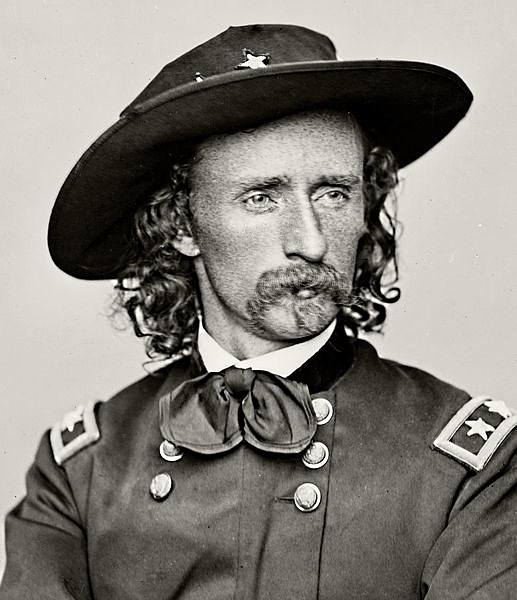

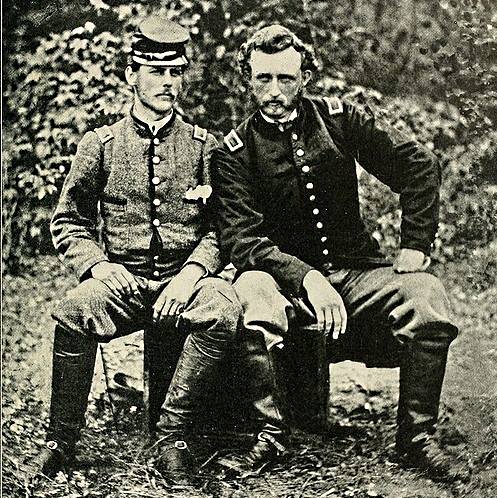
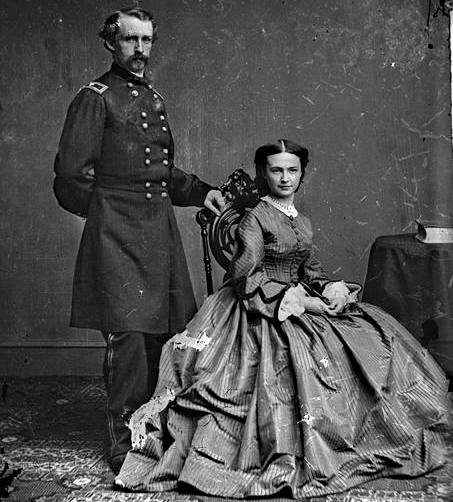
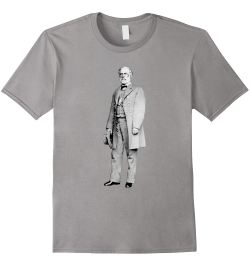
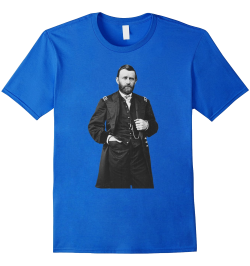

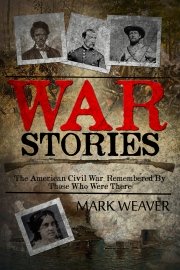
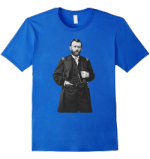
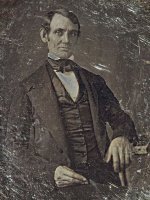
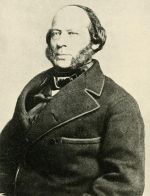
New! Comments
Have your say about what you just read! Leave me a comment in the box below.